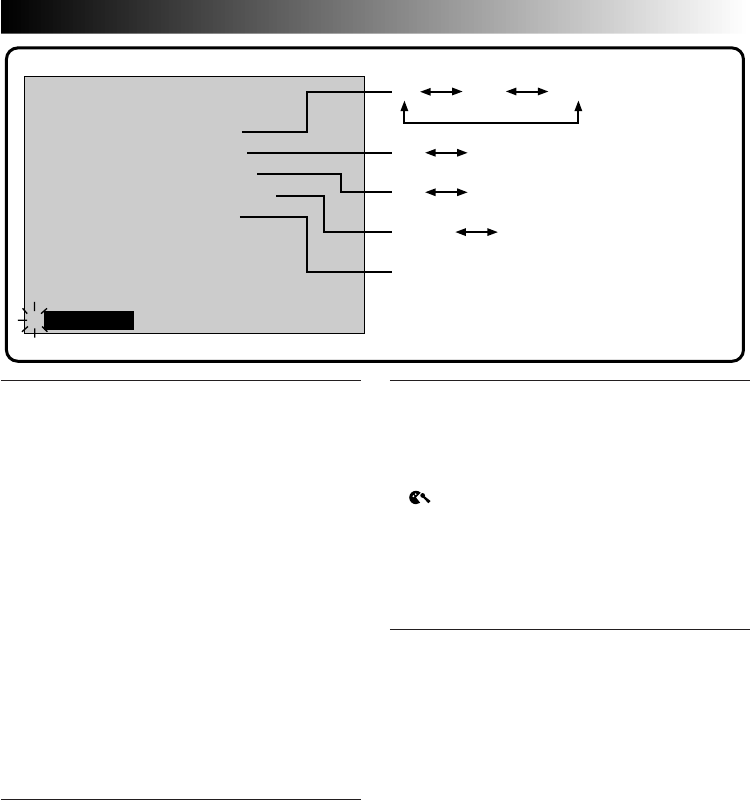
EN 37
ON
OFF
32kHz
06
5SSCENE
BEEP / TALLY
WIND CUT
SOUND MODE
ID NUMBER
RETURN
4
32kHz 48kHz
5S ANIM.
ON OFF
ON OFF
5SD
SCENE (5-Second Mode) (੬ pg. 28)
5S–Pressing START/STOP allows you to take a 5-
second “clip”. Press repeatedly for a succession of
short recordings.
5SD–If you record a 5-second clip within 5 minutes
after the previous one, the end of the old scene
dissolves and is replaced by the new scene over a
2-second period.
ANIM. (Animation)–Each time you press START/
STOP, a 1/8-second recording is taken. By using an
inanimate object and changing its position between
shots, you can record the subject as though it’s
moving.
•
Animation is not available in the LP mode. If you
tried to record in the LP mode after setting ANIM.,
the recording mode indicator "LP" begins to blink,
and recording goes on in the SP mode.
NOTE:
During use of SCENE effect, focus (
੬
pg. 47) and
exposure control (
੬
pg. 48) enter Full Auto
operation.
BEEP/TALLY
The beep sounds when the power is turned on or
off, and at the beginning and end of recording.
Tally lamp lights up during recording.
The following three Pro Snapshot modes (੬ pg. 30)
have a shutter sound effect: Pro Snapshot mode
with no frame, Pro Snapshot mode with frame and
Nega/Posi mode.
ON–To activate the beep/shutter sounds and tally
lamp.
OFF–To turn off the beep/shutter sounds and tally
lamp. Even though not heard while shooting,
shutter sound is recorded on the tape.
NOTE:
Beep/Tally is automatically turned on during Full
Auto operation.
This number is necessary when connecting
the camcorder to a computer [01 to 99].
WIND CUT
When activated, this mode helps cut down on noise
created by wind.
ON–When shooting in high winds, noise is
automatically reduced.
•“
” appears.
•The quality of the sound will change. This is normal.
OFF–This function is disabled.
NOTE:
The Wind Cut mode is disabled during Full Auto
operation.
SOUND MODE
Sound signals can be sampled at 32 kHz or 48 kHz.
32 kHz–The camcorder is factory-preset for 32 kHz.
This setting enables recording of stereo sound on
four separate channels, and is recommended for use
when performing Audio Dubbing.
48 kHz–This setting enables recording of stereo
sound on two separate channels.
NOTE:
A tape recorded at 48 kHz cannot be used for Audio
Dubbing.


















